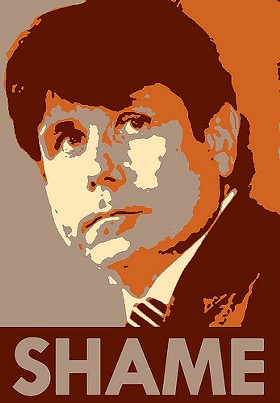The saga of Rod Blagojevich, erstwhile governor of the great state of Illinois, contestant on Celebrity Apprentice, inadvertent comedy star and fan of Elvis, Rudyard Kipling and the Chicago Cubs, has come to an end, or at least a long hiatus.
This afternoon, U.S. District Judge James Zagel sentenced Blagojevich to fourteen years in federal prison and a fine of $20,000. Blago reports to jail February 16, though it's unlikely he'll wind up serving the full term. Still, of all the Illinois governors/criminals (there have been three others in the past 40 years), his sentence is the longest.
Blago has been uncharacteristically quiet since June, when a federal jury convicted him of eighteen counts of wire fraud, attempted extortion, bribery, extortion conspiracy and bribery conspiracy, many connected to his failed attempt to exploit the "fucking golden" opportunity to sell off Barack Obama's Senate seat after Obama abandoned it for the Presidency. Under such circumstances, it was difficult for him to continue to maintain that he was, in the words of Elvis, "innocent of all charges."
"I'm here convicted of crimes. The jury decided I was guilty. I am accepting of it. I acknowledge it, and I of course am unbelievably sorry for it," Blagojevich told the court in an emotional last-ditch plea for clemency, as reported by the Chicago Tribune. "I want to apologize to the people of Illinois, to the court, for the mistakes I have made...I never set out to break the law. I never set out to cross lines....I am responsible. I caused it all. I'm not blaming anybody. I was the governor, and I should have known better. And I am just so incredibly sorry."
He most of all regretted the damage he had done to his family. "My children have had to suffer," he said. "I've ruined their innocence....It's not like their name is Smith. They can't hide. I have nobody to blame but myself."
Judge Zagel was unmoved. In a half-hour lecture, he excoriated Blagojevich for abusing the public trust and for treating the trial like a boxing match or a duel.
Zagel added that he had made a point of referring to Blagojevich as "Governor" throughout the trial to show the people of Illinois, who had elected him twice, that they get the government that they deserve. (With rhetoric like that, it can also be argued that Blago sure did get the judge he deserved.)
Blago's attorneys argued that, as governor, their client had done a lot of good things, too, including providing health insurance for children from poor families, giving free rides on public transit to the elderly and, most famously, abolishing the death penalty. Again, Zagel was unmoved.
"The harm is the erosion of public trust in government," he said. "If a state senator takes a bribe, it's one person out of 59...You are not to be compared with those of lesser positions in government. You as a governor are seen to control all of government. When it is the governor who goes bad, the fabric of Illinois is torn, disfigured and not easily repaired. You did that damage."
Leaving the courthouse, Blago was chastened, but he did not disappoint his fans: He treated them to one last recitation of his favorite poem, Kipling's "If."


